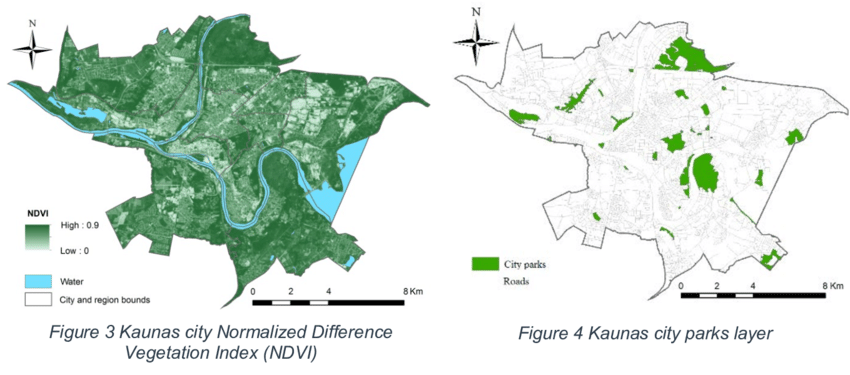There is growing scientific recognition that physical activity and contact with urban green spaces have the potential to contribute positively to citizens’ health. However, many citizens are not familiar with the impact of urban environment on health and do not use the green spaces for physical activity or recreation. The achievement of healthier urban environments and healthy behaviour requires greater awareness and education of citizens on issues of environment and health. Citizens’ engagement in the research is an approach that develops and uses new technologies within local communities to collect and analyse data and to share knowledge. Active participation enables citizens to become more aware of how they can identify and tackle local ecological issues. The research model used in the development of the project “Urban Design and Physical Activity: a Kaunas Pilot Study”, which is a part of the European Commission’s H2020-SwafS-2018 program project Citizen Science for Urban Environment and Health (CitieS-Health), is built on Participatory Action Research.
The study will be conducted through collaboration between community members, community-based organisations, public health agencies, and educational institutions with the aim of outlining the citizens’ concerns and placing them at the centre of environmental epidemiology research by developing a kit that engages the citizens and presents evidence on how the urban design and physical activity affect citizens’ health and well-being. This research will enhance the understanding of issues that affect community health. The participants will benefit from increasing knowledge and the promotion of changes in health-related behaviour.

Figures: Information on the quantity of greenness in the residential setting (i.e., the Normalised Difference Vegetation Index NDVI, Fig. 3), the residence distance to a Kaunas city parks (Fig. 4), and the frequency and duration of mobility in green and urban areas (a self-reported questionnaire).
Urban planning and green spaces are crucial for citizens’ well-being and physical activity. The achievement of healthier urban environments and healthy behaviour requires greater awareness and education of citizens on issues of environment and health. The Kaunas pilot study is an example of the use of citizen science to engage the public in environmental issues and education and to provide sound evidence for decision-making. “The potential benefits of citizen science for population health science include understanding the complexity of the local public health problems, public awareness of and respect for well-being, and suggestions of health and policy interventions”, explains Regina Grazuleviciene, from the Department of Environmental Science, Vytautas Magnus University (Lithuania) and coordinator of the CitieS-Health Kaunas pilot.
This participatory approach of the Kaunas CitieS-Health pilot study has a potential for a greater engagement of the society in knowledge production and use, the elucidation of the local environmental problems, tackling local ecological issues, and sharing knowledge. The collaborative research enhances the understanding of issues that affect the community’s health; the participants will benefit from increasing knowledge and the promotion of changes in health-related behaviour. This study will help the citizens acquire research skills, new knowledge, experience collaborating with scientists, and knowledge about healthy behaviour. The created toolkit on urban design and citizens’ physical activity will provide opportunities for new local and international collaborative research and policy recommendations.
This news has based on the article:
Citizens education through participatory research learning: a Kaunas pilot study
Regina Grazuleviciene, Sandra Andrusaityte, Audrius Dedele
Department of Environmental Science, Vytautas Magnus University (LITHUANIA)
Proceedings of EDULEARN19 Conference
1st-3rd July 2019, Palma, Mallorca, Spain
ISBN: 978-84-09-12031-4 8391
